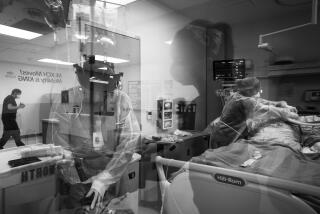Cardiac scanning for low-risk people is of little value, study says
- Share via
CT scanning to check people’s hearts for a build-up of plaque has been popular for more than a decade. But a new study casts doubt on the value of such screening in people who are at low risk for heart disease.
Widespread screening for heart disease using computed tomographic angiography -- or CT angiography -- is often touted as a way for people to make sure they’re not going to suddenly drop dead from a heart attack. But controversy has surrounded use of the technology for people who don’t have any significant risk factors for heart disease. In the new study, researchers at Johns Hopkins Ciccarone Center for the Prevention of Heart Disease in Baltimore, studied the value of CT angiography in 2,000 people in a health screening program in Seoul. One thousand people had CT angiography and 1,000 others did not. None of the participants had any heart disease symptoms.
Among the people screened, 21% tested positive for heart disease. Those patients were more likely than the unscreened patients to receive prescription medication as a result of the positive test, undergo further testing, and have revascularization surgery to clear blocked coronary arteries. But, 18 months after the screening, there was no difference in cardiac events between people in the screened and unscreened groups. One cardiovascular event occurred in each group (one case of angina and one cardiac death).
Testing positive for heart disease on a CT scan typically causes doctors to take substantial interventions to protect their patients. But even extra prescriptions, tests and therapies in the screened group did not seem to make a difference regarding cardiovascular events, the authors said.
Given the costs of CT testing, and the radiation exposure of the scan, the small benefit of scanning low-risk people may not be worth it, they said.
“Overdiagnosis is threatening to become an increasingly important public health problem because of the enthusiasm for and proliferation of unproven screening tests,” said Dr. Michael S. Lauer, of the National Heart, Lung and Blood Institute, writing in an editorial accompanying the study, published online Monday in the Archives of Internal Medicine.
”...While it seems perfectly obvious that early detection of disease must lead to better outcomes, unsophisticated statistical analyses can lead to misleading impressions of benefit. Screening tests should lead to interventions more likely to benefit than harm individuals.”
Related: How much medical testing is too much?
Return to Booster Shots blog.





